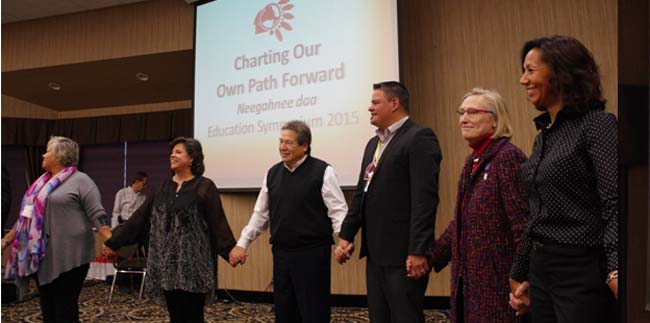Chiefs look at tangible next steps for education

By Rick Garrick
The development of tangible next steps in education was raised during a meeting between First Nation leaders, INAC minister Carolyn Bennett and former prime minister Paul Martin at the Chiefs of Ontario Education Symposium.
“Our meeting with the minister was about what are our tangible next steps and what are they in the immediate (time period), not waiting until the next fiscal year,” says Regional Chief Isadore Day. “We are looking at getting information, getting our processes laid out this fiscal year.”
Day says the meeting also featured comments from Martin that educators across the country are generally prepared to get behind First Nations once the next steps are in place.
“The educators realize that those types of processes have to come from within, that education is cultural, and that education has to be owned by the people that are going to acquire and benefit from that education,” Day says. “All along, going back to the Indian residential school system, that was never the proper way to do it. Our next step, and it was conveyed by Paul Martin to the minister, (is) get the plan and let’s move forward. Essentially, in our meeting with the minister, it was reiterated — we’re going to get the plan. We’ll put some commitments in place around the types of tables and internal processes that are going to have to happen for us to move the yardsticks on getting that to happen.”
Day also stressed that the importance of local education needs was raised during the meeting with Bennett.
“We saw the proposed Bill C33, that legislation didn’t work, the national process won’t work,” Day says. “A regional process in Ontario won’t work if it’s just an exclusive pan-Ontario approach. And we’ve been quite clear — in the meeting the minister understands that we are going to have to get our work done to ensure that all the communities and regions within Ontario, for example the remotes, are going to have to have their process well stated in terms of what the capacity issues are.”
Bennett says her job as the minister of Indigenous and Northern Affairs Canada is to facilitate First Nations education, noting that education is the biggest issue facing First Nations people.
“It isn’t me that is going to do this,” Bennett says. “It is going to be listening to the kind of expertise that is assembled here over these three days and understanding that my job is to not get in the way of what they know works.”
Bennett says she was invited by Day to the Education Symposium, held from Nov. 17-19 at the Victoria Inn in Thunder Bay, immediately after being sworn in as INAC minister.
“I have learned a lot from (Day) over the years,” Bennett says. “I think that his suggestions on the use of Elders, not only in my department, but for Canada is timely at this time of crisis. I was quite moved by his mention of what is happening around the world and how Elders could help us think and feel our way through this.”
Day says Elders have never been seen as part of the national dialogue even though they perform opening and closing ceremonies at events across the country.
“In our own communities, when we have difficulties, we go to our Elders and they help clarify because they have and they carry the wisdom,” Day says. “In this case here, I have made the suggestion that as Canada looks to correct and fix its identity and to heal as a nation, that we afford Indigenous Elders an opportunity to be part of that process.”
The Education Symposium featured an opening skit by the Centre for Indigenous Theatre, an opening keynote address by Martin and a closing keynote address by Chief Wilton Littlechild. Other speakers included Stan and Peggy Wilson on Indigegogy, Cynthia Wesley-Esquimaux on Building Bridges, Jean Clinton on the Importance of Wellness and Dolores Wawa on Championing Native Language and Education.


